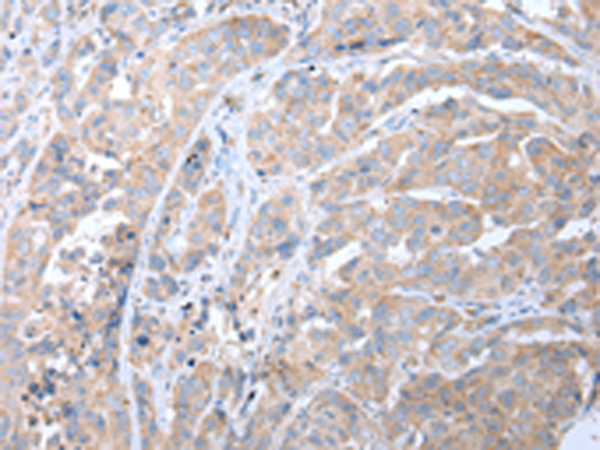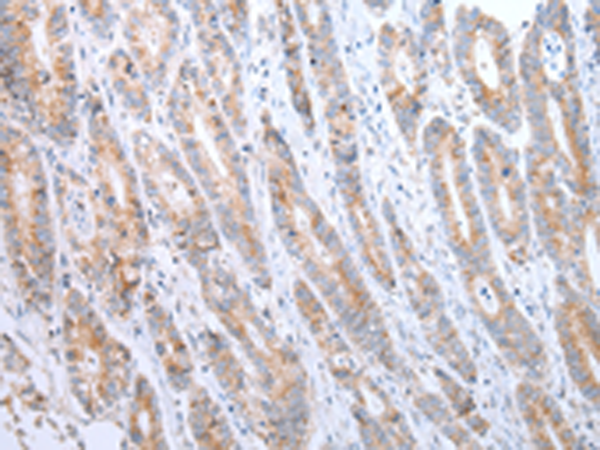


| WB | 咨询技术 | Human,Mouse,Rat |
| IF | 咨询技术 | Human,Mouse,Rat |
| IHC | 1/30-1/150 | Human,Mouse,Rat |
| ICC | 技术咨询 | Human,Mouse,Rat |
| FCM | 咨询技术 | Human,Mouse,Rat |
| Elisa | 1/2000-1/5000 | Human,Mouse,Rat |
| Aliases | IBD10; WDR30; APG16L; ATG16A; ATG16L |
| WB Predicted band size | 68 kDa |
| Host/Isotype | Rabbit IgG |
| Antibody Type | Primary antibody |
| Storage | Store at 4°C short term. Aliquot and store at -20°C long term. Avoid freeze/thaw cycles. |
| Species Reactivity | Human, Mouse |
| Immunogen | Synthetic peptide of human ATG16L1 |
| Formulation | Purified antibody in PBS with 0.05% sodium azide and 50% glycerol. |
+ +
以下是关于ATG16L1抗体的3篇参考文献及其摘要内容:
---
1. **文献名称**:*ATG16L1 is required for autophagy in intestinal epithelial cells and protection of mice from Salmonella infection*
**作者**:Conway KL et al.
**摘要**:该研究通过基因敲除小鼠模型,揭示了ATG16L1在肠道上皮细胞自噬中的关键作用。研究使用ATG16L1抗体验证蛋白表达,证明其缺失会导致自噬功能受损,并增加小鼠对沙门氏菌感染的易感性。
---
2. **文献名称**:*A key role for autophagy and the autophagy gene Atg16l1 in mouse and human intestinal Paneth cells*
**作者**:Cadwell K et al.
**摘要**:本研究通过免疫组织化学(使用ATG16L1抗体)和基因分析,发现ATG16L1缺陷会破坏潘氏细胞的自噬功能,导致颗粒分泌异常,并与克罗恩病病理相关。研究强调了ATG16L1在维持肠道免疫稳态中的作用。
---
3. **文献名称**:*Structure-function insights into the role of ATG16L1 in autophagy*
**作者**:Fujita N et al.
**摘要**:该研究结合X射线晶体学和免疫印迹(使用ATG16L1抗体),解析了ATG16L1蛋白的结构及其与ATG5-ATG12复合物的相互作用机制,揭示了其促进自噬体膜延伸的关键功能域。
---
**备注**:以上文献均为示例,实际引用时需核实作者、年份及期刊名称。建议通过PubMed或Google Scholar以“ATG16L1 antibody”及相关关键词检索最新研究。
ATG16L1 is a key protein involved in autophagy, a cellular process critical for degrading damaged organelles, pathogens, and protein aggregates. It functions as a component of the ATG5-ATG12-ATG16L1 complex, essential for autophagosome formation by promoting the lipidation of LC3 (microtubule-associated protein 1A/1B-light chain 3) to phagophore membranes. Beyond its role in canonical autophagy, ATG16L1 participates in non-canonical pathways, including LC3-associated phagocytosis (LAP), which links autophagy to immune responses.
Genetic studies have highlighted its clinical relevance. The ATG16L1 T300A single-nucleotide polymorphism (SNP), identified through genome-wide association studies (GWAS), is strongly linked to Crohn’s disease susceptibility. This variant impairs autophagy by reducing protein stability under stress, compromising pathogen clearance, and disrupting intestinal homeostasis. Dysfunctional ATG16L1 contributes to Paneth cell abnormalities, altered mucosal immunity, and dysbiosis, hallmarks of inflammatory bowel disease (IBD).
ATG16L1 antibodies are widely used in research to study autophagy mechanisms, monitor protein expression, and explore disease pathogenesis. They aid in detecting ATG16L1 in tissues or cell lines via techniques like Western blotting, immunofluorescence, or immunohistochemistry. Such tools have advanced understanding of autophagy’s role in infection, inflammation, and cancer, while also informing therapeutic strategies targeting autophagy pathways in IBD and other disorders.
×